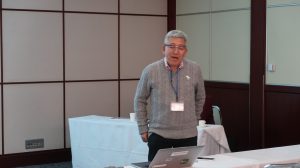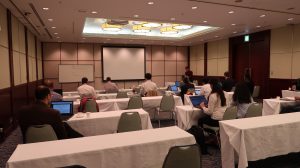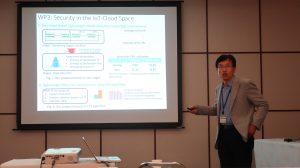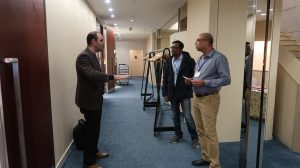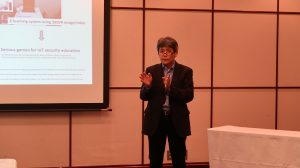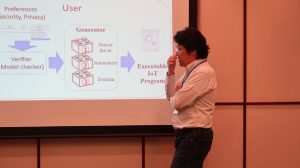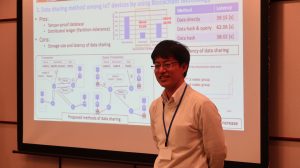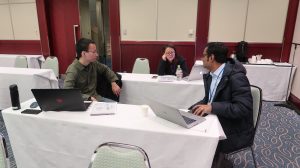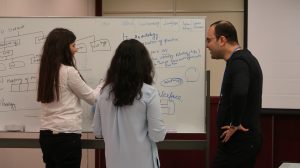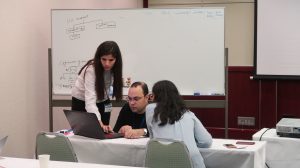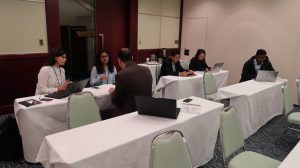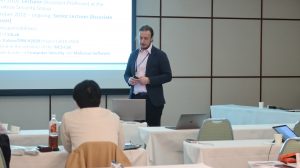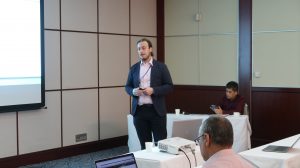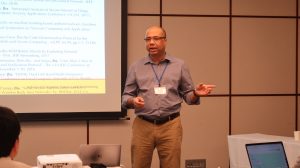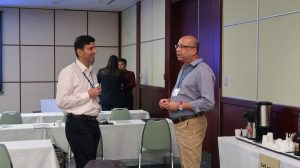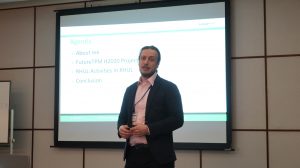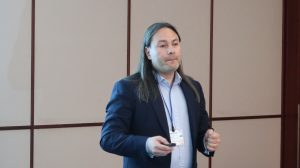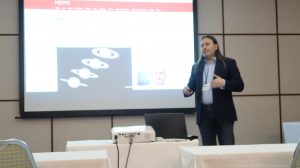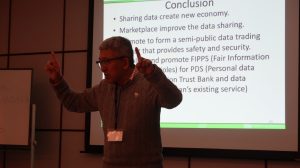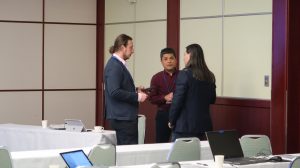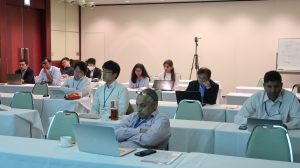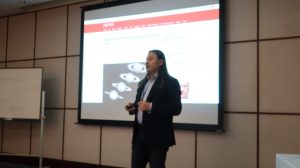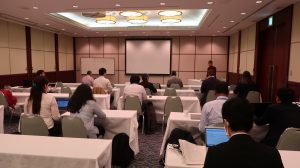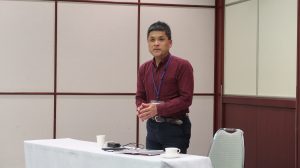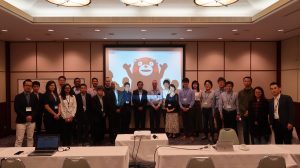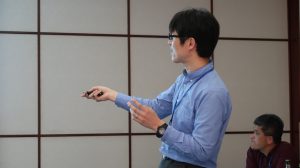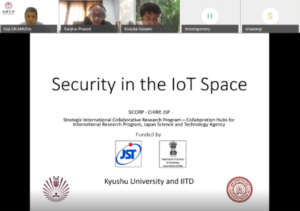九州大学・IIT-Delhi 日印合同ワークショップ
日程: 2019年4月18日(木)- 19日(金)
場所: 三井ガーデンホテル熊本
18th
9:30-10:30
| SICORP Meeting(1) | Koji Okamura, Kousuke Kaneko,Koji Inoue, Yoshihiro Okada
Sanjiva Prasad, Smruti Ranjan Sarangi, Subodh V. Sharma, Ranjan Bose |
| WP-I(1) | Alaa Mohammed Attia Allakany Geeta, Srishti kulshrestha |
| WP-II(1) | Zhang Haibo, Yan Naung Soe, Dutta Sabyasachi Lorenzo Cavallaro, Sgandurra Daniele, Sanjay Jha |
11:00ー12:30
| SICORP Meeting(2) | Koji Okamura, Kousuke Kaneko, Koji Inoue, Yoshihiro Okada Sanjiva Prasad, Smruti Ranjan Sarangi, Subodh V. Sharma, Ranjan Bose |
| WP-I(2) | Alaa Mohammed Attia Allakany, Shi Wei, Akira Haga Geeta, Srishti kulshrestha |
| WP-II(2) | Su Jiawei, Zhang Haibo, Yan Naung Soe, Dutta Sabyasachi Lorenzo Cavallaro, Sgandurra Daniele, Sanjay Jha |
14:00ー15:00 Keynote Ⅰ
| Hiroshi Mano (C.E.O./Ph.D. EverySense,Inc) | Overview new concept of Data Trading Market Service. |
 |
EverySense is a new concept data trading market service operator who stands on simple neutral policy. This service provides mediation of the data provider and the data user, and function of exchange and settlement. However, this data trading market service provider is significant distinct service compares to existing data brokers.This service provider never collects, hold, process, and trade of data by themselves to maintain the fairness of trading.This session presents a new concept with an actual demonstration by existing EveyrSnse services. |
Related Documents
15:00-16:00 Keynote Ⅱ
| Sanjay Jha (UNSW) | Challenges in Secure Deployment of Internet of Things, |
 |
In this talk, I will discuss how the community is converging towards the IoT vision having worked in wireless sensor networking and Machine-2-Machine(M2M) communication. This will follow a general discussion of security challenges in IoT. Finally I will discuss some results from my ongoing projects on security of bodywork devices and Secure IoT configuration management. Wireless bodyworn sensing devices are becoming popular for fitness, sports training and personalized healthcare applications. Securing the data generated by these devices is essential if they are to be integrated into the current health infrastructure and employed in medical applications. In this talk, I will discuss a mechanism to secure data provenance and location proof for these devices by exploiting symmetric spatio-temporal characteristics of the wireless link between two communicating parties. Our solution enables both parties to generate closely matching `link’ fingerprints, which uniquely associate a data session with a wireless link such that a third party, at a later date, can verify the links the data was communicated on.
These fingerprints are very hard for an eavesdropper to forge, lightweight compared to aditional provenance mechanisms, and allow for interesting security properties such as accountability and non-repudiation. I will present our solution with experiments using bodyworn devices in scenarios pproximating actual device deployment. I will also touch upon other research on secure configuration management of IoT devices over wireless networks. |
Related Documents
16:30-17:30 Keynote Ⅲ
| Lorenzo Cavallaro (King’s College London) | TESSERACT When the Magic Wear Off -Flaws in ML for security Evaluations (and What to DO about it) |
 |
Academic research on machine learning-based malware classification appears to leave very little room for improvement, boasting F1 performance figures of up to 0.99. Is the problem solved? In this talk, we argue that there is an endemic issue of inflated results due to two pervasive sources of experimental bias: spatial bias, caused by distributions of training and testing data not representative of a real-world deployment, and temporal bias, caused by incorrect splits of training and testing sets (e.g., in cross- validation) leading to impossible configurations. To overcome this issue, we propose a set of space and time constraints for experiment design. Furthermore, we introduce a new metric that summarizes the performance of a classifier over time, i.e., its expected robustness in a real-world setting. Finally, we present an algorithm to tune the performance of a given classifier. We have implemented our solutions in TESSERACT, an open source evaluation framework that allows a fair comparison of malware classifiers in a realistic setting. We used TESSERACT to evaluate two well-known malware classifiers from the literature on a dataset of 129K applications, demonstrating the distortion of results due to experimental bias and showcasing significant improvements from tuning. |
Related Documents
17:30-18:30 Keynote Ⅳ
| Sgandurra, Daniele (RHUL) | FutureTPM: Future Proofing the Connected World — A Quantum- Resistant Trusted Platform Module |
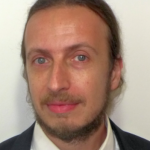 |
Research on quantum computers has drawn enormous attention from governments and industry. If, as predicted, a large-scale quantum computer becomes a reality within the next 15 years, existing public-key algorithms will be open to attack. FutureTPM is an EU H2020 research project aimed at designing and developing a Quantum-Resistant (QR) Trusted Platform Module (TPM). FutureTPM main goal is to enable a smooth transition from current TPM environments, based on existing widely used and standardised cryptographic techniques, to systems providing enhanced security through QR cryptographic functions, including secure authentication, encryption and signing functions.
FutureTPM will provide a new generation of TPM-based solutions, including hardware, software and virtualization environments, by incorporating robust and physically-secured QR cryptographic primitives. In addition, FutureTPM aims to prove and validate the applicability, usability, effectiveness and value of the QR TPM concepts, models and algorithms in real-world settings, including industry and e-commerce, which may be affected by the advent of quantum computing. |
Related Documents
18:45-20:15 Dinner
20:30-21:30 Keynote Ⅴ
| Toyokazu Akiyama (Faculty of Information Science and Engineering, kyoto Sangyo uiversity) | FESTIVAL Project and subsequent achievements |
 |
Building IoT applications is an urgent requirement for experimenting with smart city functions. In IoT applications, it is required to combine various middlewares and implement functions to collect, analyze and visualize data output from sensors, and control actuators. Furthermore, deploying various sensors and actuators into the fields, integrating open data repositories as data sources, and, coordinating stakeholders for experiment agreements are also required for deploying the applications. In order to reduce such development cost, FESTIVAL project developed a Smart ICT experiment platform. In this presentation, the platform build in FESTIVAL project is introduced and several smart city-related activities during and after the project are also shared for discussing further possibilities. |
Related Documents
21:30-23:00
| SICORP Meeting(3) | Koji Okamura, Kousuke kaneko, Yoshihiro Okada, Takatsugu ono, Kouichi sakurai, Yaokai Feng
Sanjiva Prasad, Smruti Ranjan Sarangi, Subodh V. Sharma, Ranjan Bose |
| WP-I(3) | Alaa Mohammed Attia Allakany, Shi Wei, Akira Haga Geeta, Srishti kulshrestha |
| WP-II(3) | Su Jiawei, Zhang Haibo, Yan Naung Soe, Dutta Sabyasachi, Yayoi Kamijukkoku
Lorenzo Cavallaro, Sgandurra Daniele, Sanjay Jha |
19th
8:30-10:00
| SICORP Meeting(4) | Koji Okamura, Kousuke Kaneko, Yoshihiro Okada, Takatsugu Ono, Kouichi Sakurai, Yaokai Feng
Sanjiva Prasad, Smruti Ranjan Sarangi, Subodh V. Sharma, Ranjan Bose |
| WP-I(4) | Alaa Mohammed Attia Allakany, Shi Wei, Akira Haga Geeta, Srishti kulshrestha |
| WP-II(4) | Su Jiawei, Zhang Haibo, Yan Naung Soe, Dutta Sabyasachi, Yayoi Kamijukkoku
Lorenzo Cavallaro, Sgandurra Daniele, Sanjay Jha |
13:00-17:00
| WP Meeting(1) | Kousuke Kaneko,,Yoshihiro Okada, Takatsugu Ono, Kouichi Sakurai, Yaokai Feng
Sanjiva Prasad, Smruti Ranjan Sarangi, Subodh V. Sharma, Ranjan Bose Alaa Mohammed Attia Allakany, iShi Wei, Akira Haga Geeta, Srishti kulshrestha Su Jiawe, Zhang Haibo, Yan Naung Soe, Dutta Sabyasachi, Yayoi kamijukkoku Lorenzo Cavallaro, Sgandurra Daniele, Sanjay Jha |
20th
| WP Meeting(2) | Kouichi Sakurai, Yaokai Feng
Sanjiva Prasad, Smruti Ranjan Sarangi, Subodh V. Sharma, Ranjan Bose Geeta, Srishti kulshrestha Su Jiawe, Zhang Haibo, Yan Naung Soe, Dutta Sabyasachi, Yayoi Kamijukkoku Lorenzo Cavallaro, Sgandurra Daniele |

